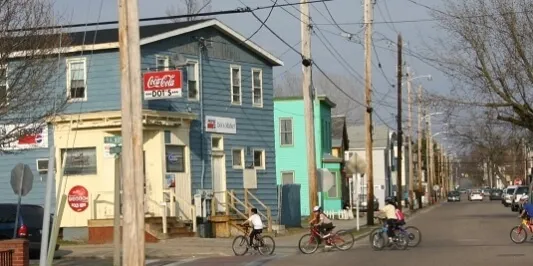
"Make no little plans, they have no magic." (Chicago Planner, Daniel Burnham, 1846-1912)
Why become a planner?
Planners use critical thinking, strong written and oral communication, technical skills, and community engagement to help create livable cities and towns and to promote environmentally healthy communities across the rural-urban spectrum. Specialty areas include affordable housing, vibrant public spaces, transportation and land use, and equitable access to community services.
Planning at the University of Vermont
Recent graduates of geography, Environmental Sciences, and other disciplines have gone into planning jobs and Master’s programs in the field. Careful course selection from the areas identified below, and taking advantage of internship and study abroad opportunities, will provide UVM students with a robust planning curriculum. Faculty support and advising is available through the geography department.
Urban and regional planning
“Cities have the capability of providing something for everyday, only because, and only when, they are created by everybody.” – Jane Jacobs
Cities and towns are complex centers of cultural exchange and critical hubs for innovation and advancement. Urban and regional planning plays a vital role in the social and economic prosperity of a city/town/region and overall quality of life. As growth continues to be concentrated around urban cores, new challenges arise. Dense urban development tends to be energy-efficient and inspires city planners to develop sustainable cities of the future. Planning is a multidisciplinary field that encompasses a wide range of positions.
Regional planning in rural Vermont: A unique perspective
Vermont’s natural beauty, resources, and rural characteristics make it a unique place to work as a planner. There are eleven Regional Planning Commissions (RPCs) that provide assistance and planning expertise for the municipalities they serve. They are considered political subdivisions, and each is governed by a locally appointed board. Although some are specialists in a particular field, most regional planners work on a wide variety of projects in various disciplines. Working under a regional plan, Vermont RPCs assist municipalities with the following planning tasks:
- Transportation planning
- Land use
- Water quality improvements
- Hazard mitigation and preparedness
- Housing
- Energy planning
- Economic development
- Brownfield assessment and remediation
Related majors/minors: geography, environmental studies, community development and applied economics (CDAE), geospatial technologies (GST), political science, civil engineering (CEE), and many more!
Planning Resources
- Take planning-related courses at UVM (PDF).
- Consider planning-related opportunities while doing study abroad.
- Explore internships in planning
- Learn more about what city and town planning departments (PDF) across the country are looking for in entry-level hiring.
- Check out the resources of professional organizations, such as the American Planning Association’s (APA) Knowledge Center.
- Consider creating your own individually designed minor in urban and regional planning
- Interested in Sustainable Transportation? Visit the STVT Blog! And also check out UVM MOVE, a student-led club that explores transportation systems and a space to learn about the transportation field from local professionals.